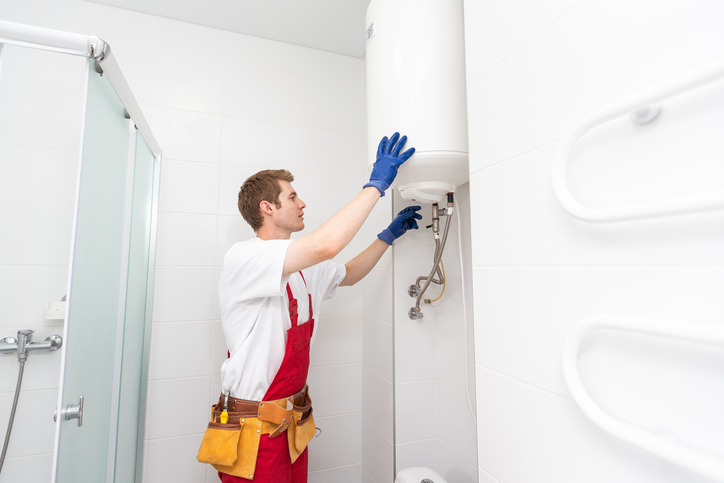Water heaters play a crucial role in providing hot water for daily activities like showering, cooking, and cleaning. When they break down, homeowners often wonder which type—propane or electric—is easier to repair. Each system has its own complexities, with differences in components, safety concerns, and the availability of replacement parts. While electric water heaters tend to have simpler internal mechanisms, propane models require more caution due to gas lines and combustion systems. Factors such as repair costs, required expertise, and common failure points also impact the ease of repair. This article explores the key differences between a propane and an electric water heater repair to help homeowners understand which option might be more manageable when issues arise.
1. Complexity of Internal Components
Electric water heaters have a straightforward design with fewer moving parts, making them generally easier to repair. They operate using heating elements and thermostats that can be replaced relatively quickly. In contrast, propane water heaters involve more complex components such as gas burners, pilot lights, and venting systems. Any issues with the gas supply or combustion process require additional troubleshooting, which can make propane heaters more difficult to repair. Additionally, propane heaters need proper ventilation to expel exhaust gases safely, adding another layer of complexity when diagnosing and fixing problems.
2. Common Issues and Their Fixes
Electric water heaters commonly experience issues like heating element failures, thermostat malfunctions, or tripped circuit breakers. These problems are relatively simple to diagnose, and replacing a heating element or thermostat usually requires only basic tools. Propane water heaters, on the other hand, often suffer from issues like pilot light failures, gas valve problems, or burner blockages. These repairs may require more expertise, as dealing with gas lines and ignition systems carries a higher risk of hazards. While both types of heaters experience sediment buildup that can affect efficiency, flushing the tank is a universal maintenance task that applies to both.
3. Safety Concerns During Repairs
Safety is a major consideration when repairing a water heater, and propane models pose more risks due to the presence of combustible gas. Working with propane requires caution to prevent leaks, explosions, or carbon monoxide buildup. A professional should handle any repair involving the gas line or burner assembly to avoid dangerous consequences. Electric water heaters, while not risk-free, mainly involve electrical components that can be safely worked on after shutting off power to the unit. The risk of electrocution exists, but it is generally easier to manage compared to the potential dangers of a gas leak in a propane heater.
4. Availability of Replacement Parts
Finding replacement parts for electric water heaters is typically easier because they have standardized components such as heating elements, thermostats, and wiring. These parts are widely available at hardware stores and can often be installed by a knowledgeable homeowner. Propane water heaters, however, have specialized parts like gas regulators, pilot assemblies, and burners that may not be as readily accessible. Additionally, certain brands or older propane models might require ordering parts from a manufacturer, leading to delays in repairs. The ease of finding replacement parts gives electric heaters a slight advantage when it comes to quick fixes.
5. Cost of Repairs
Repair costs for electric water heaters are generally lower because their components are inexpensive and widely available. Heating elements and thermostats, the most commonly replaced parts, typically cost between $20 and $50, and installation is relatively simple. Propane water heater repair tends to be more expensive due to the specialized components and the need for professional servicing. Gas-related issues, such as replacing a gas control valve or repairing a burner assembly, can cost several hundred dollars. Additionally, if a propane heater requires venting modifications or a gas leak inspection, the costs can increase further. Homeowners looking for a more budget-friendly repair option may find electric models more cost-effective in the long run.
6. DIY vs. Professional Repairs
Electric water heaters are more DIY-friendly, allowing homeowners with basic plumbing and electrical skills to handle common repairs like replacing heating elements or resetting thermostats. With proper safety precautions, many minor electric heater issues can be resolved without professional assistance. Propane water heaters, however, are best repaired by licensed technicians due to the risks involved with gas leaks, ignition issues, and carbon monoxide exposure. Even seemingly simple tasks, like relighting a pilot light, require knowledge of proper procedures to ensure safety. While some handy homeowners may feel comfortable working on their propane heaters, most gas-related repairs should be left to professionals.
7. Maintenance Requirements and Long-Term Repair Needs
Regular maintenance plays a key role in preventing major repairs for both electric and propane water heaters. Electric models require occasional heating element replacements and thermostat adjustments but do not need venting maintenance. Propane water heaters, however, require additional upkeep, such as cleaning the burner, inspecting the vent system, and ensuring there are no gas leaks. The increased maintenance demands of propane models can lead to more frequent service calls, making them more challenging to maintain over time. Homeowners who prefer a low-maintenance water heating system may find electric units easier to manage.
8. Environmental Considerations and Long-Term Reliability
From an environmental standpoint, electric water heaters are considered safer because they do not produce combustion gases. They are less prone to issues related to ventilation or carbon monoxide buildup, making them a more reliable option in certain households. Propane water heaters, while more energy-efficient in some cases, rely on fuel combustion, which can lead to residue buildup and burner malfunctions over time. Because electric models have fewer parts that can fail due to wear and tear, they tend to have a slightly longer lifespan with fewer complex repairs. For homeowners looking for a hassle-free system with minimal environmental risks, electric heaters offer a more straightforward repair experience.
When it comes to ease of repair, electric water heaters have a clear advantage due to their simpler design, lower safety risks, and easy access to replacement parts. Common repairs, such as replacing heating elements or thermostats, are relatively straightforward and can often be handled without professional help. Propane water heaters, while efficient, require specialized knowledge for repairs involving gas lines, pilot lights, and combustion systems. Safety concerns, higher repair costs, and increased maintenance demands make propane models more challenging to service. Homeowners looking for a water heater that is easier to repair over time may find that electric units provide a more convenient and cost-effective solution.
If your water heater needs servicing, consult a professional from Kerrville Plumbing Plus to determine the best repair options. Whether you have a propane or electric model, regular maintenance can extend its lifespan and improve performance. Call us at (830) 896-0111 to schedule a maintenance check!




